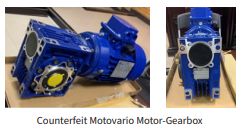Dear readers,
We start with a contribution regarding a case of trademark enforcement: recently won by HFG, the "Motovario-Case" is one of our best examples of how an efficient and consistent anticounterfeiting campaign can be successful.
The second article explains how "OMO 奥 妙", a Unilever brand, widely known to the public in relation to laundry detergents, has been recognized as well-known and able to invalidate a copycat trademark.
Do you know what's Roujiamo? It's one of the most famous street foods in China, considered the Chinese hamburger, with a long tradition all over the country despite the origin in Shaanxi province.
What happens if a new association registers a collective trademark and asks all the shops to stop using that name or pay royalties? Read the article to discover it!
After all these issues about trademarks, we have a contribution that tries to give an answer to the request, typically Chinese, to have a trademark certificate for every product: how to explain the double soul of trademark certificates, being the most unvalued thing by foreign companies and the most valued thing from Chi-nese companies?
HEYTEA is a beverage brand that is taking the world by storm. Proudly made in China, HEYTEA is already part of China's pop culture. The product? Bubble tea with cheese topping. Can you believe that the brand got copied in Singapore?
The last article underlines the necessity to stay positive, or better: to think positive and stay actually negative! And in the overview of some ironic art production, it gives some suggestion on how to protect art under the copyright law in China.
Trademark Enforcement/CHINA
Fire up the engines: the successful case of MOTOVARIO
The "Motovario-Case" is one of our best examples of how an efficient and consistent anticounterfeiting campaign can be successful.
Motovario is a company involved in the production of sales of worm gear reducers, NMRV and MOTOVARIO trademarks. Their products, already synonymous with quality and reliability since its foundation in 1965, are quite popular in Asia and in China especially.
As we all know, since imitation is the sincerest form of flattery, with the increase of such success, the number of counterfeited products increased accordingly.
Being always caring about the quality, Motovario is also sensitive when it comes to counterfeits, aiming to keep "clean" the name and the story of their products and to not allow the consumers to be misled about the source of their worm gear reducers.
Over the years, Motovario has successfully carried out take down campaigns on the web and exhibition fairs against the counterfeiters.
But let's go to straight to the main success.
In 2020, after discovering a company manufacturing and selling of counterfeited products bearing the MOTOVARIO trademark, Motovario International Trading (Shanghai) Co., Ltd. [ 摩铎利国际贸易(上海)有限公司 ] sued that company and its sole shareholder in front of the Dongguan City Second Intermediary People's Court.
The company was the registrant of the infringing domain names and websites www.motovario-gear.com, www. motovario-china.diytrade.com selling products infringing Motovario's trademark and making acts of unfair competition.

Motovario appointed HFG to initiate a civil litigation for trademark infringement and unfair competition. Motovario requested to the Court:
- An order that the defendant shall cease trademark infringement against MOTOVARIO trademarks.
- An order that the defendant shall assume damage for trademark infringement for RMB 500,000.
- An order that the defendant shall make an apology statement on national newspapers.
Simultaneously, Motovario filed property preservation with the court, to freeze the defendant's bank account, and to make the enforcement procedure quicker in case of success. Additionally, Motovario also filed notarized evidence of the infringing conducted in their detriment.
In order to increase the chances of having recognized a high amount of damage compensation, during the litigation Motovario point out the popularity of MOTOVARIO's brand in continental China through the submission of several evidence.
Despite the efforts of the defendant to prove they get the reducer machine legally, on December 2021, the Judge issued the decision, confirming that the defendants had sold fake MOTOVARIO products through the two fake MOTOVARIO website, which constituted trademark infringement, and the Court supported most of our claims.
According to the Court's word, both companies had to immediately stop selling counterfeit products, shut down their website and pay compensation to Motovario for the economic loss.
This decision represents a success in terms of recognition of the infringement of the defendants in detriment of Motovario and shows how the Courts are becoming more and more sensitive to the intellectual property rights in China.
"We have achieved an excellent and fair result" says Motovario General Manager in China , Mr. Rosario Pizzimenti.
Silvia Capraro
HFG Law&Intellectual Property
Trademark invalidation/CHINA
""OMO 奥妙" cleans up its reputation and gets well-known
With a recent decision, the Beijing Higher People's Court recognized that ""OMO 奥妙" brand is widely known to the public in relation to laundry detergents and thus it can be protected as well-known trademark under Article 13.3 of the Trademark Law.
With a recent decision, the Beijing Higher People's Court recognized that ""OMO 奥妙" brand is widely known to the public in relation to laundry detergents and thus it can be protected as well-known trademark under Article 13.3 of the Trademark Law.
Article 13 of the Trademark Law aims to provide wellknown trademark owners with strengthened protection. Generally, normal trademark owners are being protected for similar or identical trademark over similar goods/ services, while well-known trademarks can be protected over dissimilar goods/services (the so-called cross-class protection).
Whether cross-class protection can be granted depends mainly on the degree of well-knownness of the claimed well-known trademark, the likelihood of consumer confusion and other circumstances that may infringe the interests of the registered owner of the well-known trademark.
The "OMO 奥 妙 " case is a typical example showing the requirements of reaching a well-known status of a registered trademark. "OMO 奥 妙" is a brand of fabric detergent owned by Unilever (the plaintiff), which entered the Chinese market in the early 1990s and has been known to Chinese consumers for nearly three decades.
Click here to continue reading . . .
The content of this article is intended to provide a general guide to the subject matter. Specialist advice should be sought about your specific circumstances.



